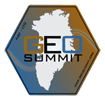| PI | Institute/Department | |
|---|---|---|
| Culler, Lauren Elizabeth |
Dartmouth College, Institute of Arctic Studies
|
| Program Manager | Funding Agency | |
|---|---|---|
| Rom, Elizabeth |
NSF, Office of Polar Programs
|
This grant continues support begun under NSF grant 1506155 for the Joint Science Education Project (JSEP) program in Greenland. The Joint Committee, a high-level forum involving the Greenlandic, Danish and U.S. governments, initiated JSEP in 2007 to educate an international community of high school students and teachers from each of the three nations about the causes and consequences of rapid environmental change. The goals of JSEP include inspiring the next generation of polar scientists, building strong networks of students and teachers among the three countries, and providing an opportunity to practice language and communication skills by taking students from the three nations to Greenland to observe polar science in action. From 2018 to 2022 (with 2020 being remote), Dartmouth JSEP team participants will visit Greenland each summer to engage in the Kangerlussuaq Science Field School and lead Science and Education week at Summit Station. The PIs will also travel to Nuuk to advance partnerships with Greenlandic institutions. The 2018 JSEP effort features two field deployments: spring preparatory trips, and the July summer intensive. In early May/June, one co-PI and five graduate/undergraduate students will fly via a combination of ANG and commercial air to conduct research around Kangerlussuaq while camping in the sand dune area along the road. These grad students will lead some of the activities during the Field School and SciEd portion of the project, which commences in late June when the international group assembles in Kangerlussuaq. Also in 2018, the team will be joined in Kanger by two people from Dartmouth Office of Communications who will observe the student interactions with Dartmouth researchers. The summer intensive begins in late June with the arrival of PIs, additional grad students, and US high school students via ANG for the JSEP led Kangerlussuaq Science Field School activities. At the start of Science Education Week (SciEd), the high school group will fly to EastGrip (EGRIP) via the ANG where two Dartmouth grad students plus teachers from all 3 participating nations will lead activities for the students. When the EastGrip visit is over, the group will return to Kangerlussuaq and participate in additional hands-on reflection activities. The U.S. participants will return to their points of origin via the ANG to Scotia, New York and commercial air. The 2019 JSEP effort begins in late June with a staggered arrival of PIs, additional grad students, and US high school students via ANG for the JSEP led Kangerlussuaq Science Field School activities. At the start of Science Education Week (SciEd), the high school group will fly to EastGRIP via the ANG where two Dartmouth grad students plus teachers from all 3 participating nations will lead activities for the students. When the EastGRIP visit is over, the group will return to Kangerlussuaq and participate in additional hands-on reflection activities. At the end of SciEd, the JSEP participants will travel homeward spending one in Nuuk, Greenland and through Reykjavík, Iceland. In 2020, due to travel restrictions related to COVID-19, JSEP turned to an alternative program for U.S., Greenland, and Danish high school students to learn about the polar regions and participate in inquiry-based science activities from home. Teachers and students will return for two more field seasons, 2021 and 2022.
The NSF contractor will provide commercial travel for US-based high school students and two US teachers, ANG coordination to include passenger and cargo movements as well as EGRIP flights; user days in Kanger; lodging in Nuuk and Reykjavik; truck rentals; ECW gear; camping, communications and safety equipment from inventory. All other logistics and support will be organized and paid through the grant.
| Season | Field Site | Date In | Date Out | #People |
|---|---|---|---|---|
|
2018
|
Greenland - Summit
|
|
|
33
|
|
2021
|
Greenland - Summit
|
|
|
30
|
|
2022
|
Greenland - Summit
|
|
|
20
|
